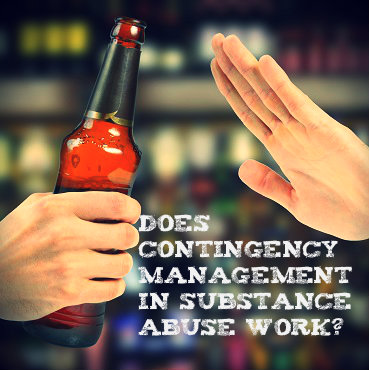Contingency management is a form of behavioral psychotherapy known to help people recover from an addiction to the stimulant drug cocaine. This therapy uses vouchers or cash prizes to encourage recovering addicts to stay active in the treatment process and meet their program goals.
In a study published in June 2014 in the journal Drug and Alcohol Dependence, a team of researchers from Wayne State University investigated the question of whether the value of the reward offered during contingency management has an impact on the therapy’s chances of producing beneficial outcomes.
Cocaine Addiction Treatment
 People addicted to cocaine have a chemical dependence stemming from the lasting changes that the drug makes inside their brains, as well as symptoms that indicate a loss of control over use of the drug and/or a clearly damaging pattern of behavior centered on drug use. When doctors treat certain forms of substance addiction, they can rely on medications proven to increase the odds that a client/patient will halt substance use and establish long-term abstinence.
People addicted to cocaine have a chemical dependence stemming from the lasting changes that the drug makes inside their brains, as well as symptoms that indicate a loss of control over use of the drug and/or a clearly damaging pattern of behavior centered on drug use. When doctors treat certain forms of substance addiction, they can rely on medications proven to increase the odds that a client/patient will halt substance use and establish long-term abstinence.
However, although a number of medications show promise as potential treatments for cocaine addiction, doctors addressing this type of addiction do not currently have a reliable medication available for their use. This means that treatment programs for people addicted to the drug must use some form of counseling or psychotherapy to provide the needed assistance.
The form of psychotherapy most commonly employed for this purpose is behavioral therapy, a term that describes any therapeutic approach designed to modify and/or replace harmful behaviors that support continued involvement in substance use.
Contingency Management
Contingency management (CM) is one of the most frequently used forms of behavioral therapy. One approach to the therapy, called voucher-based reinforcement, provides clients/patients with valuable vouchers as rewards for doing such things as producing drug-free urine tests, regularly attending treatment program activities and otherwise taking the steps required to establish drug abstinence and maintain that abstinence.
Within limits, people enrolled in voucher-based programs can choose how to redeem their vouchers.
Another approach to CM, called prize incentives contingency management, substitutes cash prizes for vouchers. When a client or patient participating in this type of contingency management reaches a program objective, he or she earns the chance to enter a drawing and win varying amounts of cash.
As a rule, the rewards in both types of contingency management go up when a program participant consistently meets his or her treatment goals.
Does The Value Of The CM Reward Matter To Addicts?
The Wayne University researchers assessed the impact of the value of the reward offered on the odds that a recovering cocaine addict will comply with his or her program objectives and avoid cocaine use.
During the study, 15 cocaine addicts participated in 10 sessions that required them to choose between drug use and taking the steps required to receive a financial reward for program compliance. During some of these sessions, the reward offered was $1; other sessions offered a reward of $3 for avoidance of cocaine use. In addition, during some of the sessions, the participants had a chance of winning $6, $12 or $24.
The conditions of the first two types of sessions mimicked the terms of voucher-based contingency management, while the conditions of the third type of session mimicked the terms of prize incentives CM. Prior to the main phase of the study, the researchers made sure that the enrolled participants still viewed cocaine use as an attractive and tempting option.
After completing their testing, the researchers concluded that, during the contingency management sessions that offered a fixed $3 reward for not using cocaine, the study participants were substantially more likely to avoid taking the drug than they were during the contingency management sessions that offered a $1 reward.
They also found that the same results held true when the study participants had to choose between using cocaine and taking a chance at winning $6, $12 or $24.
Are Both Alternative Addiction Treatment Programs Effective?
The results of the study generally confirmed the effectiveness of both voucher-based CM and prize incentives CM as methods for helping recovering cocaine addicts remain drug-abstinent.
The study’s authors also concluded that the chances that both of these approaches to contingency management will produce the desired benefits go up when the amount of the reward for avoiding drug use is relatively high.
People addicted to opioid narcotics (and other drugs of abuse) often have additional mental health issues that significantly complicate their recovery during addiction treatment. In many cases, the situation is worsened by recovering addicts’ relatively infrequent use of available psychiatric services. In a study published in November 2013 in the journal Drug and Alcohol Dependence, researchers from Johns Hopkins University assessed the usefulness of an approach called contingency management (CM) in increasing recovering opioid addicts’ willingness to participate in psychiatric treatment. The researchers found that appropriate use of contingency management can significantly boost program participants’ attendance for psychiatric services.
Opioid Addiction And Mental Illness
 Like other forms of drug and alcohol addiction, opioid addiction is officially classified as a form of mental illness by the American Psychiatric Association. This is true because continued, excessive use of addictive substances literally alters the function of the human brain, and thereby fosters a range of serious, dysfunctional changes in everyday behavior. In addition, opioid addictions (and other substance addictions) often appear at the same time as other forms of diagnosable mental illness such as depression, schizophrenia or anxiety disorders.
Like other forms of drug and alcohol addiction, opioid addiction is officially classified as a form of mental illness by the American Psychiatric Association. This is true because continued, excessive use of addictive substances literally alters the function of the human brain, and thereby fosters a range of serious, dysfunctional changes in everyday behavior. In addition, opioid addictions (and other substance addictions) often appear at the same time as other forms of diagnosable mental illness such as depression, schizophrenia or anxiety disorders.
Numerous factors help explain the overlap between addiction and these mental illnesses, including the ability of substance abuse/addiction to trigger the onset of additional illness and the ability of non-substance-based mental illnesses to increase the risks for involvement in substance use. Research also indicates that substance addiction and other forms of mental illness share several important common risk factors that increase their likelihood of appearing together.
Contingency Management Basics
Contingency management is a behavior modification technique that uses rewards (and, in some cases, punishments) to bring about desired results in a drug treatment program or other therapeutic setting. One common form of this approach, called voucher-based reinforcement or VBR, uses the distribution of vouchers for services or material goods to encourage treatment compliance.
Another form of CM, called prize incentives contingency management, motivates compliance by giving patients a chance to win cash with every significant step toward active treatment participation. Contingency management is used in programs that treat addiction to substances such as opioid narcotics, marijuana, amphetamine, methamphetamine, alcohol and nicotine. Some programs use the technique to encourage abstinence during the course of recovery. Others use it to encourage participation in the psychiatric programs that address other forms of mental illness in people involved in substance addiction treatment.
Addicts Willing To Remain In Drug Rehab With Contingency Management
In the study published in Drug and Alcohol Dependence, the Johns Hopkins University researchers used an assessment of 125 adults going through outpatient treatment for opioid dependence to gauge the effectiveness of contingency management in improving the willingness to receive psychiatric services during participation in an addiction recovery program. Half of these individuals received $25 vouchers for each week of full participation in a 12-week course of psychiatric treatment. The remaining adults had access to the same psychiatric treatment, but did not receive vouchers or any other form of reward for treatment attendance. The researchers measured each group’s level of attendance after each month of the program.
After reviewing their findings, the researchers concluded that, compared to an approach that doesn’t employ contingency management, use of voucher-based CM nearly doubles the level of psychiatric treatment attendance after one month of treatment. In addition, use of vouchers more than doubles the level of attendance after two months of treatment and after three months of treatment. People who receive vouchers for psychiatric services remain in opioid addiction treatment just as often as people who don’t receive vouchers. They also successfully avoid using opioid drugs with equal frequency.
Contingency Management’s Clear Benefits In Addiction Programs
The authors of the study published in Drug and Alcohol Dependence believe that the use of contingency management techniques provides clear benefits for encouraging the use of psychiatric services in opioid addiction programs. However, they note that their research only looked at psychiatric services delivered to patients in a purposeful, coordinated manner during the course of addiction treatment.
Services delivered in other ways may or may not receive the same attendance boost from the contingency management approach. The authors also note that the specific type of psychiatric treatment offered in any given program may have a considerable impact on the usefulness of CM. In addition, program managers may need to alter or modify their use of CM in order to meet the specific challenges faced by their patient clientele.
Read More About Drug Rehab Treatment And Contingency Management
Choosing the right alcohol or drug rehab treatment strategy can be a challenge for someone still struggling with addiction. One of the most confusing aspects for many is simply figuring out which therapy does what. It’s critical information because it will guide you toward making the best decisions regarding treatment. This article will help you understand the treatment approach known as contingency management (CM) and how it helps addicts during recovery.
Contingency Management Basics
 Contingency management is based on a simple principle: behavior that is rewarded is behavior more likely to be repeated in the future. It’s a principle we see all the time in everyday life. For example, a teen may earn an allowance for taking on extra chores, or a boss may award her employees with bonuses for excellent performance.
Contingency management is based on a simple principle: behavior that is rewarded is behavior more likely to be repeated in the future. It’s a principle we see all the time in everyday life. For example, a teen may earn an allowance for taking on extra chores, or a boss may award her employees with bonuses for excellent performance.
Although it can be used to treat alcohol abuse, CM is most commonly employed as to treat drug abuse and addiction. The therapy is also used by health professionals to help people overcome a range of challenges, including weight loss, exercise motivation, and cigarette smoking. Additionally, contingency management is sometimes utilized to increase the likelihood a patient will take medication as directed.
How Exactly Is CM Used In Substance Abuse Treatment?
During substance abuse treatment, CM reinforces positive, drug-free behavior with explicit, tangible rewards. One of the most common ways to use this reinforcement is to allow addicts to earn vouchers for goods and services, like movie tickets, retail goods, sports equipment, or electronics, after they’ve submitted a specified number of drug-free urine samples. In some programs, the reward has a fixed dollar amount, such as $25. Other treatment plan rewards may increase in value the longer the drug abuser stays clean. For example, a voucher may hold a starting value of $10 and increase by $2 for each negative sample the addict provides. The goal is to encourage substance abusers to remain abstinent during outpatient treatment.
Why CM Promotes Healthy Behaviors In Addicts
In addition to promoting abstinence, CM can be used to promote other healthy behaviors in addicts. Addiction therapists may reward patients for attending a certain number of 12-step meetings or showing positive behaviors during drug rehab treatment. One program offered housing and behavioral treatment to homeless cocaine addicts in exchange for staying drug-free [1].
Another form of contingency management involves medication for methadone patients. Recovering addicts may be permitted to take methadone doses home if they increase positive behaviors or cease negative ones. A patient, for instance, could earn the right to take home one dose a week after submitting a specific number of drug-negative urine tests.
Contingency management can be an appropriate treatment for many addicts, however, it’s considered especially helpful for those in high-risk groups. For example, this drug rehab treatment has been used to reduce dangerous injection-related behaviors, which increase the risk of acquiring HIV and other bloodborne diseases [2]. CM has also been used successfully to treat pregnant women with addiction. One review of numerous studies concluded that contingency management was more effective at keeping pregnant women in drug treatment than motivational interviewing, another addiction therapy [3].
Effectiveness Of Contingency Management For Drug Abuse
Contingency management has proved to be an effective treatment for substance abuse disorders. One review of 47 studies found that incorporating it into treatment improved drug abstinence rates during recovery. However, it also suggested that contingency management may be more effective for those with opiate or cocaine addiction than for those with multiple drug addictions [4].
Research also suggests CM is useful for keeping addicts in outpatient therapy. Typically, many substance abuse patients miss scheduled appointments; one estimate puts the number as high as 60%. However, in one study, researchers gave addicts who attended scheduled group therapy the chance to draw from a prize bowl, which contained vouchers for prizes ranging from $1 to DVD players. Recovering addicts were more likely to attend weekly sessions when reinforced with contingency management than when they were not [5]. Another study discovered that 84% of outpatient substance abusers receiving vouchers stayed in treatment over 8 weeks, while only 22% of non-voucher patients did so [6].
Contingency Management Drug Addiction Treatment Plan
Like many drug rehab treatment options, CM is not intended to be used as a sole therapy. It’s often used in conjunction with other addiction treatments. For example, cognitive-behavioral therapy (CBT) is one approach a therapist could pair with contingency management. During CBT, the alcoholic or drug addict will identify the negative behaviors and emotions that contribute to addiction.
The cost of contingency management can prevent some substance abuse clinics from using this therapy. Some evidence suggests that CM is not as effective when the value of the vouchers is too low [7]. The cost of vouchers attractive enough to change addiction behavior can quickly add up. In one study, addicts received vouchers worth more than $1,000 over the course of treatment [8].
Some experts have raised concerns that incentives, such as those that allow substance abusers the opportunity to draw a random prize from a bowl, increase the risk for pathological gambling. However, prize drawings in CM have not been shown to promote excessive gambling, according to the National Institute on Drug Abuse [9].
Critics Of Contingency Management For Drug Rehab Treatment
Contingency management is not without critics. Some opponents of this approach assert that contingency management amounts to bribing drug users to stay clean. Another concern of critics is that some addicts will deceive treatment professionals by providing clean urine samples that do not belong to them, thus collecting the incentive without meeting their own obligation to stay abstinent. Additionally, those against this approach argue that CM does not directly address underlying issues that contribute to substance abuse. However, it’s important to note that contingency management is often paired with other treatments developed to produce long-term behavioral changes.
Drug rehab treatment may be one of the most important decisions you’ll ever make. Speak with an addiction professional to learn if contingency management is the right choice for you.
References:
[1] http://www.sciencedirect.com/science/article/pii/S0376871600800083
[2] http://www.ncbi.nlm.nih.gov/pmc/articles/PMC2271179/
[3] http://www.ncbi.nlm.nih.gov/pubmed/17943878
[4] http://onlinelibrary.wiley.com/doi/10.1111/j.1360-0443.2006.01581.x/abstract
[5] http://www.ncbi.nlm.nih.gov/pmc/articles/PMC2606605/
[6] http://psycnet.apa.org/journals/ccp/68/2/250/
[7] http://www.ncbi.nlm.nih.gov/pubmed/16445548
[8] http://ajp.psychiatryonline.org/article.aspx?articleID=174754
[9] http://www.drugabuse.gov/publications/principles-drug-addiction-treatment-research-based-guide-third-edition/evidence-based-approaches-to-drug-addiction-treatment/behavioral-0


